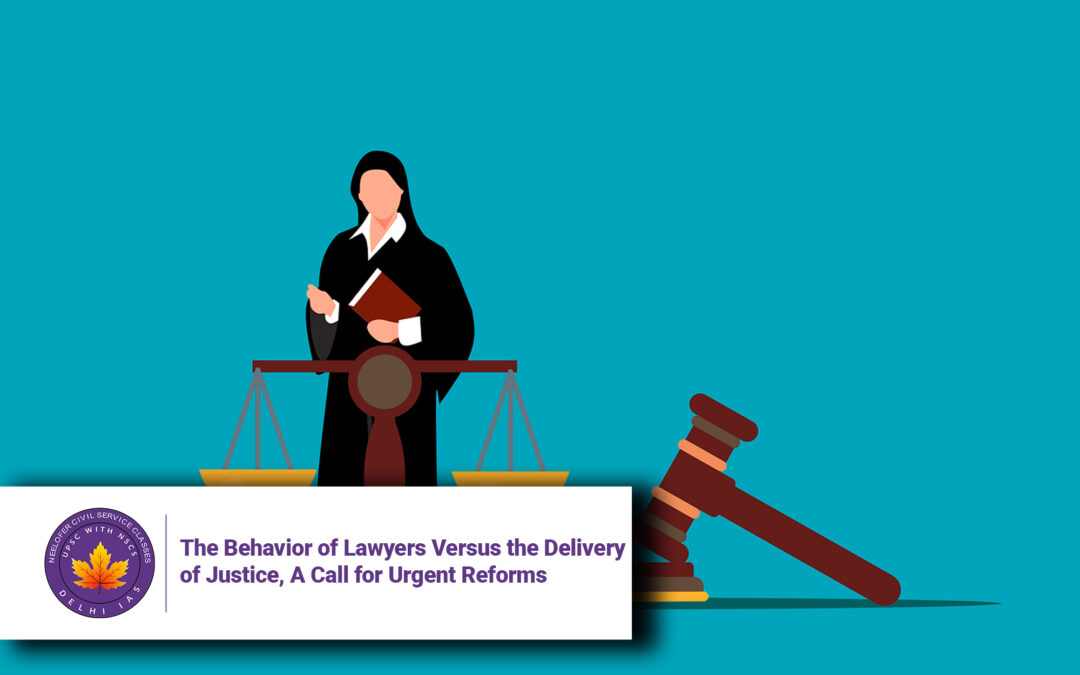The Behavior of Lawyers Versus the Delivery of Justice, A Call for Urgent Reforms
Introduction
The legal profession is often regarded as a noble vocation, dedicated to upholding justice and the rule of law. However, recent trends in India and globally have raised serious concerns about the conduct of lawyers and its impact on the delivery of justice. From frequent strikes over trivial grievances to the misuse of adjournments for personal gain, the behavior of some advocates has undermined public trust in the judiciary. This article delves into the critical issues highlighted by Pradeep S. Mehta, examining the root causes of professional misconduct, its consequences, and potential solutions to restore judicial discipline.
The Menace of Lawyer Strikes
One of the most glaring issues in the legal profession is the rampant use of strikes by lawyers to protest minor grievances. Unlike other professions, where strikes are a last resort, advocates in India have weaponized this tactic, often leaving litigants stranded and delaying justice.
Case Studies of Unjustified Strikes
-
Uttar Pradesh Boycott (February 2023): Lawyers in Uttar Pradesh boycotted courts for days, leaving thousands of cases pending. The reason? A dispute over parking facilities. This incident highlights how trivial issues can disrupt the entire judicial process.
-
Karnataka Boycott (August 2023): Advocates in Karnataka refused to attend court for three days after a judge insisted on professional attire. Instead of addressing the matter through dialogue, they chose to stall judicial work, affecting countless cases.
-
Delhi Strike (October 2022): When an advocate was accused of threatening a magistrate, the local bar association called for a strike in solidarity, further delaying justice.
These incidents reflect a troubling pattern where strikes have become a routine response to even the most minor inconveniences, directly contradicting the Supreme Court’s ruling in the British Penal Case (2026), which stated that strikes should only be permissible in extreme circumstances involving judicial dignity.
The Adjournment Model: Delays as a Profit Strategy
Another critical issue is the misuse of adjournments by lawyers to prolong cases unnecessarily. This practice not only frustrates litigants but also turns the judiciary into a profit-making enterprise for unscrupulous advocates.
Key Problems with Adjournments
-
Consumer Commission Delays: Over two-thirds of advocates admit to exploiting “exceptional circumstances” clauses to seek repeated adjournments, nullifying the Consumer Protection Act’s mandate for timely resolutions.
-
Judicial Backlogs: Courts are overwhelmed with pending cases, many of which are delayed due to frivolous adjournment requests. A senior judge-lawyer noted that implementing strict adjournment caps could significantly reduce case backlogs.
-
Profit Over Justice: Lawyers often benefit financially from prolonged litigation, creating a perverse incentive to delay cases rather than resolve them efficiently.
The Accountability Debate: Are Lawyers Above the Law?
A controversial Supreme Court ruling in March 2022 further complicated the issue by declaring that advocates do not qualify as “service providers” under the Consumer Protection Act. This decision immunized lawyers from consumer complaints, even in cases of gross negligence or deficient service.
Implications of the Ruling
-
Erosion of Accountability: Lawyers can no longer be held liable for poor service, discouraging professionalism.
-
Precedent for Other Professions: This ruling could extend to other professions, such as healthcare, where accountability is already a contentious issue.
Learning from Global Best Practices
To address these challenges, India can draw lessons from countries with more disciplined legal systems.
Successful Models
-
South Africa: Strict adjournment laws limit cases to three postponements, with penalties for frivolous delays. This has restored public confidence without compromising professional autonomy.
-
Singapore: The judiciary operates on strict timelines, with 80% of cases adhering to scheduled hearings. Lawyers face sanctions for unprofessional conduct, ensuring efficiency.
Proposed Reforms for India
To restore judicial discipline, the following reforms are urgently needed:
-
Ban on Frivolous Strikes: The Advocates Amendment Bill of 2025, which proposed banning strikes, should be revived and enforced.
-
Strict Adjournment Caps: Limit adjournments to three per case, with exceptions only for genuine emergencies.
-
Professional Accountability: Establish an independent body to investigate grievances against lawyers and impose penalties for misconduct.
-
Timely Enforcement Mechanisms: Automatically transfer cases to higher courts if delays persist in lower courts.
-
Public Awareness Campaigns: Educate litigants about their rights to reduce exploitation by unscrupulous lawyers.
Conclusion
The behavior of lawyers has a direct impact on the delivery of justice. While strikes and adjournments are sometimes necessary, their misuse has eroded public trust in the judiciary. By implementing balanced reforms—drawing from global best practices and enforcing strict accountability—India can restore judicial discipline and ensure that the legal profession truly serves justice.
5 Q&A
Q1: Why do lawyers in India frequently go on strikes?
A1: Lawyers often strike over trivial issues like parking disputes or dress codes, misusing strikes as a tool for protest instead of addressing grievances through proper channels.
Q2: How do adjournments delay justice?
A2: Lawyers exploit adjournments to prolong cases, turning delays into a profit strategy. This clogs courts and frustrates litigants seeking timely resolutions.
Q3: What was the impact of the Supreme Court’s 2022 ruling on lawyer accountability?
A3: The ruling exempted lawyers from consumer complaints, reducing accountability for poor service and setting a dangerous precedent for other professions.
Q4: Which countries have effective systems to prevent judicial delays?
A4: South Africa and Singapore have strict adjournment laws and penalties for frivolous delays, ensuring efficient case resolution.
Q5: What reforms are needed to improve India’s legal system?
A5: Key reforms include banning frivolous strikes, capping adjournments, enforcing professional accountability, and adopting global best practices for judicial efficiency.







